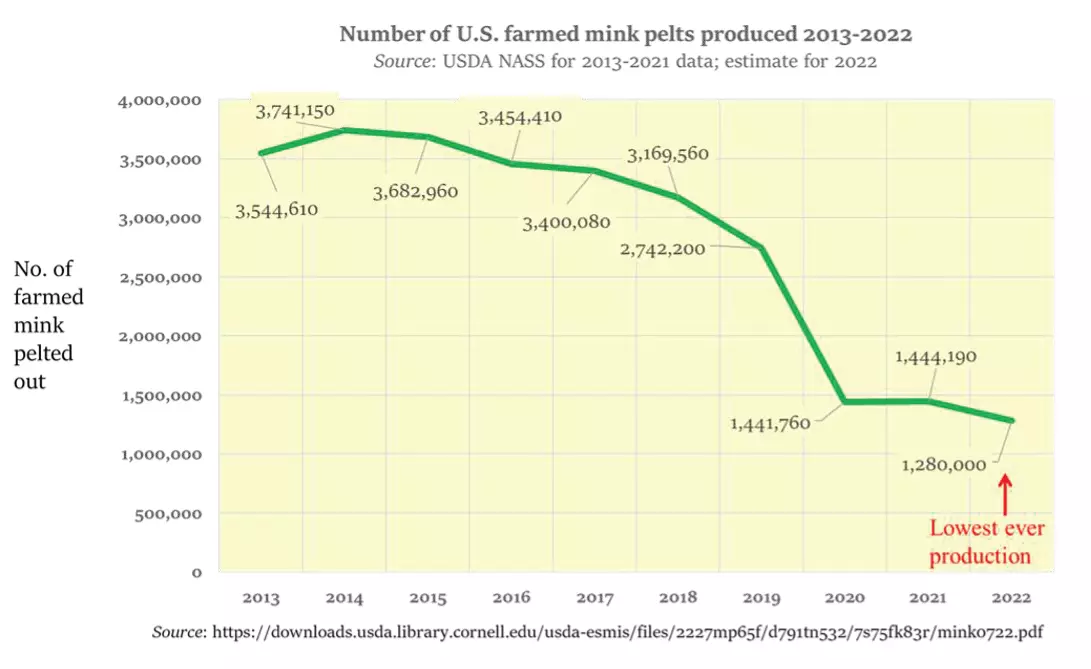No need to put homeland at risk to sell mink pelts to China’s elites
Washington D.C. — Animal Wellness Action and the Center for a Humane Economy applauded Reps. Nancy Mace, R-S.C., and Rosa DeLauro, D-Conn., for leading an effort in Congress to phase out mink farming in the United States because of documented zoonotic-disease threats and demonstrably inhumane treatment of animals.
Evenly divided by political party, original cosponsors of the Minks in Narrowly Kept Spaces Are Superspreaders (MINKS) Act also include Reps. Jeff Van Drew, D-N.J., Veronica Escobar, D-Texas, Brian Fitzpatrick, R-Pa., Madeleine Dean, D-Pa., Lance Gooden, R-Texas, and Paul Tonko, D-N.Y.
The Mace-DeLauro MINKS Are Superspreaders Act prohibits the possession, transport, and sale of captively raised mink for fur production. In the 117th Congress (2021-22), the House passed a very similar bill led by Reps. DeLauro and Mace as an amendment to the COMPETES Act, but the measure was dropped from the final measure of the broader legislative package.
“Mink farms no longer produce raw garments for American consumers, exporting all pelts to shrinking foreign markets, mainly in China,” said Wayne Pacelle, president of Animal Wellness Action and the Center for a Humane Economy. “This negligible foreign commerce is no longer worth the domestic risks, given that factory-farmed mink are potential super-spreaders of avian influenza, COVID-19, and other dangerous zoonotic diseases.”
“The MINKS Are Superspreaders Act represents a crucial, bipartisan step towards preventing another disease outbreak, like COVID,” said Rep. Mace. “In addition, we have the chance to end the abusive and inhumane mink farming practice.”
In 2023, mink production was expected to sink below 1 million animals for the first time in decades, with only 50 farms operating in the United States generating gross revenues of just $39 million (with costs of production and distribution exceeding that amount). In 1966, which was the high-water mark for U.S. production, 6,000 mink farmers killed 6.2 million animals for pelts. American mink farms today are unprofitable, unregulated in some states, and kept afloat by government subsidies.

The collapse of demand for the pelts has been accelerated by a massive worldwide SARS-CoV-2 epidemic in farmed mink that has paralleled the human COVID-19 pandemic starting in 2020, with outbreaks on at least 450 mink farms in 13 countries in Europe, Canada, and the United States. Only humans and mink contract the virus in large numbers and can spill it back to other species—with more than 21 million captive mink (including culling) and more than 7 million people perishing directly as a result of the pandemic.
“Farmed mink are highly susceptible to and readily transmit and amplify avian-, human-, and mammalian influenza A strains as well as the COVID-19 virus,” said Jim Keen, D.V.M. Ph.D., the director of veterinary science for the Center for a Humane Economy and a former USDA infectious disease specialist.
Keen notes that a zoonotic bird flu H5N1 mink mutant strain infected and caused the deaths of more than 200,000 farmed mink on six farms in Spain and Finland in 2022-2023. This bird flu strain has killed 458 of 873 human cases, a case fatality rate of 53% that is much higher than any known influenza virus, including the infamous 1918 H1N1 pandemic strain.
“We know beyond any doubt that mink farming poses a high risk for zoonotic diseases while contributing almost nothing to our economy,” said Tom Pool, D.V.M., MPH., senior veterinarian with Animal Wellness Action. “The risk-reward ratio for mink farming makes absolutely no sense.”
Keen and Pool are authors of a January 2022 study on the mink farming and COVID-19 connection.
Mink farms in Europe and the United States spawned five deadly COVID-19 variants (Cluster 5 in Denmark and the Netherlands, Marseille-4 in France, N501T in Michigan, Y453F in Poland, and unreported mutations in Latvia). These are the only confirmed cases of spillover of COVID-19 variants from animals to people. For more information and graphics, see this fact sheet.

